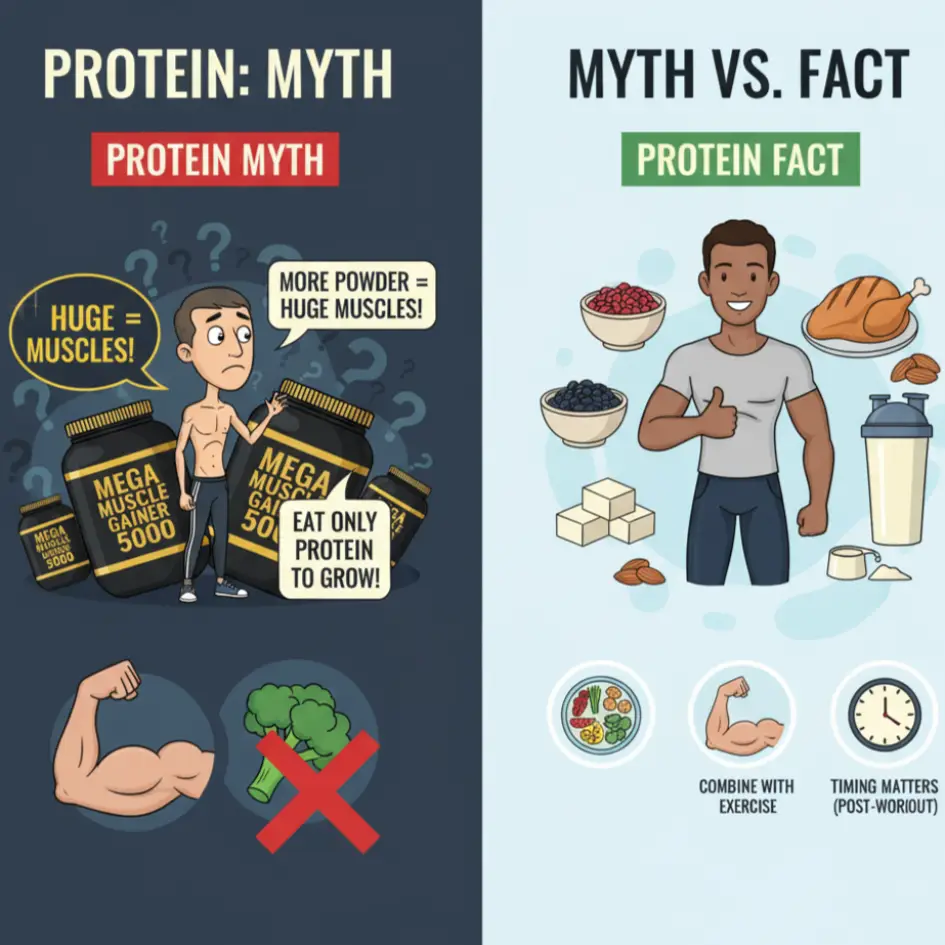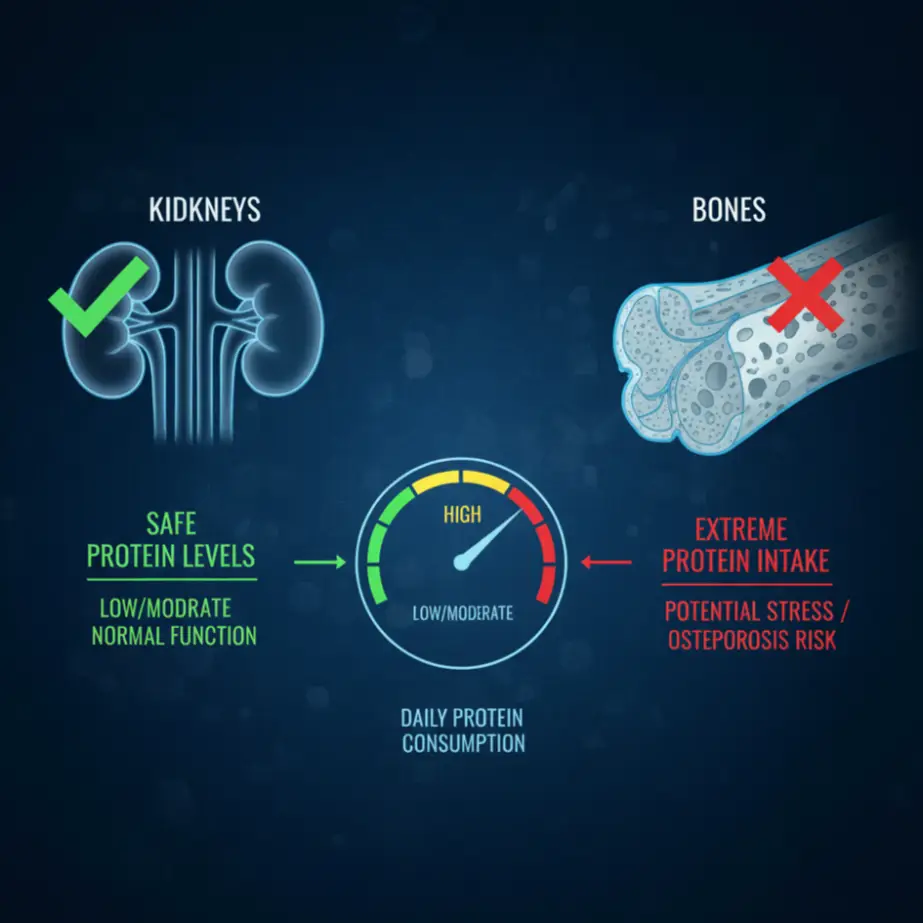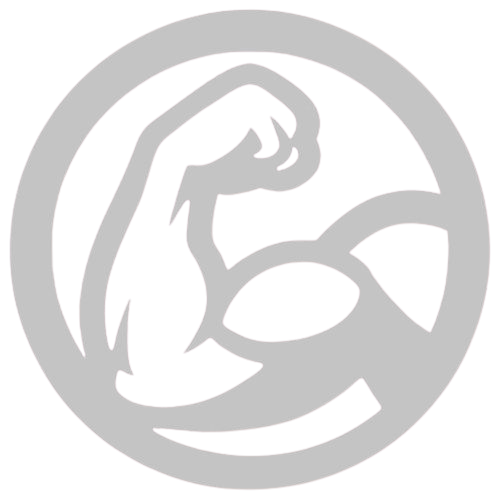Protein Myths Debunked has become one of the hottest fitness topics because misinformation spreads faster than evidence. From fears about kidney damage to confusion about powders, myths cloud smart nutrition choices. This article breaks down fact vs fiction using science, so you know what really matters for building muscle and staying healthy.

Table of Contents
Protein Myths in Bodybuilding
Protein Myth Bodybuilding Explained
In gyms, protein myths dominate locker room conversations. One of the biggest is the idea that bodybuilders must consume 300–400 grams of protein daily to grow. Science paints a different picture. Research shows muscle protein synthesis maxes out at 1.6–2.2 g per kilogram of bodyweight. Beyond that, your body simply oxidizes excess protein for energy.
This doesn’t mean protein is unimportant. It’s critical for recovery, muscle repair, and growth. But chasing extreme intakes wastes money and often crowds out other essential nutrients like carbs and fats.
Protein Powder Side Effects: Truth vs Exaggeration
Protein powders carry a stigma thanks to myths about dangerous side effects. The most common claims include:
- They harm kidneys
- They cause acne
- They are unsafe for long-term use
Here’s the truth: in healthy individuals, no credible study links protein powders to kidney damage. Minor side effects like bloating or digestive discomfort usually come from lactose intolerance (in whey) or poor-quality powders.
When chosen wisely, powders are simply concentrated food. For beginners, check out our guide on the Best Protein Powder for Beginners.
Protein Myths and Facts
Protein Myth vs Fact: Breaking Confusion
Let’s tackle a few common claims head-on:
html| Protein Myth | Fact |
|---|---|
| Protein powders are unsafe | Safe if tested and used responsibly |
| You can’t build muscle on plants | Plant protein supports growth if total intake is adequate |
| Women get bulky from protein | Women lack testosterone levels to bulk like men |
The Great Protein Myth (BBC Perspective)
A BBC program once argued most people eat more than enough protein. That’s true for sedentary adults. But athletes, lifters, and older adults benefit from higher intakes. The real takeaway? Context matters. General population averages don’t apply to athletes aiming for hypertrophy.
Too Much Protein Myth

Is Too Much Protein Dangerous?
One of the oldest claims is that protein damages kidneys and bones. Yet clinical trials show no harm in healthy adults consuming even 3 g/kg for extended periods. The kidney myth originates from studies on patients with existing kidney disease, not healthy lifters.
Bone health? Another myth. In fact, protein supports bone density when paired with calcium-rich foods.
Too Much Protein Myth in Reddit Debates
Reddit threads often exaggerate risks. You’ll see claims like, “Protein shakes wreck your liver.” Without context, these posts mislead. Research consistently shows protein is safe in reasonable ranges. Extreme intakes only become problematic if other nutrients are ignored.
Protein Safety and Supplements
Is Protein Powder Safe Long-Term?
For most, yes. Whey, casein, soy, and pea protein are widely studied. No evidence links them to harm in healthy adults. The key is avoiding poorly regulated products that may contain fillers or contaminants.
How to Choose Safe Protein Powders
Always look for:
- Transparent labels
- Third-party testing
- Clear amino acid profile
We’ve broken down How to Read Protein Supplement Labels to help you shop smarter.
Protein Deficiency vs Excess
How Can a Deficiency in Protein Affect Health?
Protein deficiency is rare in Western diets but still occurs in strict vegans, the elderly, or those under-eating. Symptoms include:
- Loss of muscle mass
- Weak immune function
- Poor recovery
- Hair and skin problems
Balance: Deficiency vs Too Much
Both extremes cause issues. The best approach? Aim for balanced protein intakes. Check our full guide on Protein for Different Diets – Vegan, Keto, etc..
Protein Timing and Recovery

Does Protein Timing Matter?
Another myth is the “anabolic window.” Many believe you must drink a shake within 30 minutes post-training or lose gains. Studies now show the window is much wider—up to several hours.
Protein and Recovery Myths
Slow-digesting proteins like casein can actually benefit overnight recovery. Timing helps, but total daily intake is what matters most. Learn more in our guide on Protein Timing and Recovery.
Protein in Diets and Lifestyle
Protein Myths for Women vs Men
A persistent myth is that women should avoid protein or they’ll get bulky. Truth: women respond to protein the same as men—improved recovery, strength, and lean tissue. Marketing often fuels this myth by promoting “pink” powders to women.
Our guide on Protein Supplements for Women vs Men breaks down the differences honestly.
Best Protein Sources: Food vs Supplements
Whole foods (meats, dairy, legumes) provide more micronutrients. But powders help when convenience matters. Smart athletes use both. See our article: Best High Protein Foods vs Supplements.
Questions About Protein
Questions to Ask About Proteins (Biology Basics)
- What are amino acids?
- How are proteins digested?
- What is biological value?
These questions help lifters understand why not all proteins are equal.
10 Questions About Proteins: Quick Answers
- How much protein per meal? ~20–40g.
- Is plant protein incomplete? No, when varied.
- Does protein spike insulin? Mildly, not harmful.
- Do seniors need more? Yes, due to anabolic resistance.
- Can protein replace carbs? No, energy needs differ.
- Do shakes work without training? They prevent deficiency but won’t build muscle.
- Is collagen protein good for muscle? No, it’s low in leucine.
- Can you get too much protein from food? Rare, but possible.
- Is timing critical? Less than daily intake.
- Is protein powder safe for teens? Yes, if it’s high quality.
Conclusion: Key Takeaways
Protein Myths Debunked shows most fears are exaggerated.
- Safe intake = 1.6–2.2 g/kg bodyweight for athletes
- Protein powders are safe if chosen wisely
- Timing myths matter less than total intake
- Women benefit equally from protein
- Deficiency and excess both carry risks
Your smartest move is to follow evidence, not gym gossip. Want the full breakdown of what’s right for you? Read our detailed guide on How Much Protein Do You Need.
FAQs
Protein myth bodybuilding
Do lifters need extreme amounts? No, beyond 2.2 g/kg there’s no extra benefit.
Protein myths and facts
Most revolve around safety, timing, and women’s use.
The great protein myth BBC
It applied to sedentary people, not athletes.
Too much protein myth
Safe in healthy individuals.
Protein myth Reddit
Online debates lack scientific context.
How can a deficiency in protein affect overall health?
Leads to weakness, poor immunity, slow recovery.
Questions to ask about proteins biology
Amino acids, digestion, biological value.
10 questions about proteins – Answered above in Part 8.
Visit my Instagram account for more
